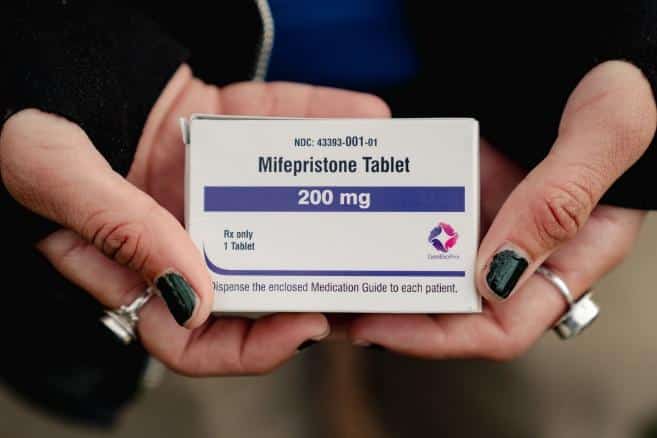
Image: Outside the Supreme Court, Washington, DC, 26 March 2024. by Shuran Huang/Washington Post via Getty Images.
The anti-abortion movement is desperately doing everything it can to block access to abortion pills. In the nearly three years without even the protections of Roe v. Wade, the number of abortions in the United States has increased. The wide availability of abortion pills and the rise of telehealth providers who see patients virtually and send pills across the country have completely transformed the landscape of reproductive health care. You can imagine how frustrated anti-abortion leaders are with this development; just when they achieved their long-awaited dream of overturning Roe, changes in Food and Drug Administration (FDA) requirements for medication abortion, along with the dedication of abortion providers and activists, have opened new avenues for care in states with abortion bans and restrictions.
Abortion with pills now constitutes 63 percent of all abortions in the country. Telehealth abortion care rose from 4 percent of all abortions in April 2022 to 19 percent in March 2024. This surge in telehealth care began during the pandemic, when the FDA lifted some restrictions on mifepristone. In 2021, the FDA eliminated the in-person dispensing requirement for mifepristone, allowing providers to use telehealth to support patients who could not or chose not to travel to clinics for in-person care. Clinicians conduct remote consultations, typically via video call appointments but also through secure text messaging, relying on the patient’s self-reported medical history and calculating gestational age based on the patient’s reported last menstrual cycle. Recent research on medical abortion provided through telehealth demonstrated the same high rates of safety and efficacy as in-person medication abortion care.
As the demand for abortion care surged in states where it remained legal after 2022 — particularly in states like Illinois, Colorado, and Kansas, which saw an influx of patients from surrounding states with bans — telehealth became essential in reducing appointment waiting times and meeting the heightened demand. Immediately after Roe was overturned, advocates in abortion-friendly states started exploring ways to protect providers from lawsuits for treating patients from banned states. Interstate shield laws, designed to protect abortion providers, supporters, and patient medical records from civil and criminal consequences related to reproductive health care provided to out-of-state residents, are now on the books in eighteen states. Since July 2023, eight states have also implemented shield laws specifically to protect telehealth abortion providers who consult with patients virtually and ship pills to states with abortion bans or telehealth abortion restrictions. Clinicians working under the protections of state shield laws provide up to 12,000 telehealth abortions each month.
Anti-abortion leaders frustrated by these legal developments are using their significant resources to undermine access to abortion pills. Last month, Texas attorney general Ken Paxton sued a doctor based in New York for providing abortion pills to a 20-year-old woman in Texas. The civil lawsuit accuses Dr Maggie Carpenter of violating Texas’s anti-abortion law and practicing medicine without a Texas medical license, seeking civil penalties of “no less than $100,000 for each violation of the law”. Carpenter, cofounder of the Abortion Coalition for Telemedicine (ACT), which supports clinicians providing telemedicine abortion care to patients in states with bans, is one of the most prominent doctors offering telehealth care. By targeting Dr Carpenter, Paxton aims to intimidate providers and dissuade them from taking any legal risks to offer abortion care to patients in states with bans.
The first legal challenge to a telehealth shield law pits abortion-hostile Texas against abortion-friendly New York in a struggle over extending abortion laws beyond state borders. “The truce over interstate abortion fights is over,” Mary Ziegler, a prominent abortion historian and law professor at UC Davis, said on X/Twitter. Abortion supporters are rightly employing every tool available to expand access for patients in states with strict bans. To protect telehealth providers from prosecution, shield laws require these providers to adhere to the laws in the state where they are located, regardless of their patients’ locations. According to these laws, providers of telehealth abortion care do not need to possess medical licenses in all the states where their patients reside; they only need to hold a medical license and comply with the laws of their home state. Abortion care has long been treated as separate from other types of medical care, so it appears reasonable for the regulations surrounding telehealth abortion care to differ from those governing other forms of telehealth services.
So according to New York law, Dr Carpenter’s actions are entirely legal.
[This article continues at length and is very informative throughout.]
SOURCE: Jacobin, by Anne Rumberger, 2 February 2025



